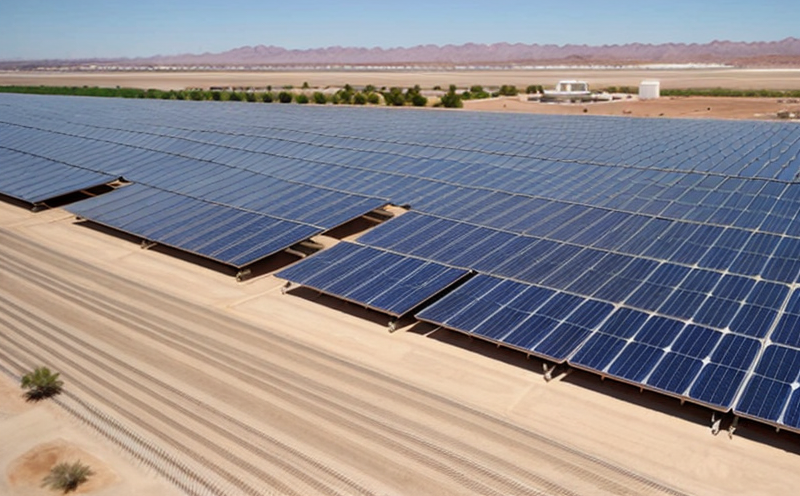EN 12977-1 Custom Built Solar Thermal System Testing
The EN 12977 series of standards provides a framework for testing and assessing solar thermal systems. This section focuses on the specific requirements set forth by EN 12977-1, which covers custom-built solar thermal systems. Compliance with these standards is crucial for ensuring that these systems meet the required safety, performance, and environmental criteria.
The test procedures outlined in this standard are designed to evaluate a wide range of parameters including but not limited to efficiency, durability, and operational characteristics. The testing process involves simulating real-world conditions under which the solar thermal system will operate. This ensures that any custom-built units meet the necessary performance benchmarks before they enter service.
The importance of such testing cannot be overstated in today’s world where sustainability is paramount. By adhering to these standards, manufacturers can demonstrate their commitment to producing high-quality products that not only perform well but also contribute positively to environmental goals. For instance, accurate temperature measurement during tests helps ensure that heat transfer fluids used within the system remain stable over time.
Custom-built solar thermal systems often incorporate unique designs tailored specifically for particular geographic locations or specific project requirements. The flexibility afforded by these custom solutions comes with challenges when it comes to standardization and certification. However, EN 12977-1 provides a robust foundation that allows testing laboratories like ours to accurately assess these bespoke systems.
During the testing process, multiple stages are involved ranging from initial setup through final evaluation. Each stage is designed meticulously so as not only to meet regulatory requirements but also to provide detailed insights into potential areas for improvement. Our team works closely with clients throughout this process ensuring all aspects of their projects receive thorough examination.
One key aspect of EN 12977-1 is the emphasis on continuous monitoring and evaluation post-installation. This ongoing assessment allows operators to fine-tune their systems based on actual performance data rather than relying solely on manufacturer specifications. Continuous improvement initiatives are therefore encouraged, as they help extend the lifespan of solar thermal installations while enhancing overall efficiency.
Another critical element addressed by this standard pertains to safety considerations. Ensuring that all components used in a custom-built system are compatible with one another is essential for preventing failures or accidents during operation. Rigorous testing helps identify any potential issues early on, thereby safeguarding against costly repairs and downtime.
| Aspect | Description |
|---|---|
| System Setup | Involves arranging the solar thermal system in a controlled environment replicating expected operational conditions. |
| Performance Metrics | Evaluates parameters such as heat transfer rate, efficiency losses, and overall performance under specified load conditions. |
| Safety Checks | Conducts thorough inspections to ensure compliance with relevant safety regulations and standards. |
Why It Matters
Compliance with EN 12977-1 is essential for several reasons. Firstly, it ensures that custom-built solar thermal systems meet stringent quality standards which are critical for their successful integration into existing infrastructure or new installations. Secondly, adherence to these guidelines helps promote best practices within the industry by encouraging innovation and continuous improvement.
From an economic perspective, meeting regulatory requirements can open up additional market opportunities both domestically and internationally. It also provides peace of mind knowing that your product meets all necessary criteria without having to worry about potential recalls or liability issues down the line. Lastly, it contributes significantly towards reducing carbon footprints by promoting cleaner energy solutions.
Scope and Methodology
- Initial Setup: Arranging the solar thermal system in a controlled environment to replicate expected operational conditions.
- Performance Metrics: Evaluating parameters such as heat transfer rate, efficiency losses, and overall performance under specified load conditions.
- Safety Checks: Conducting thorough inspections to ensure compliance with relevant safety regulations and standards.
Industry Applications
This testing methodology finds application across various sectors including residential, commercial buildings, industrial facilities, and utility-scale power plants. In each case, ensuring that the solar thermal system operates efficiently is paramount.
- Residential: Ensuring home owners receive reliable hot water supply while minimizing energy costs.
- Commercial: Supporting large enterprises in reducing their carbon emissions footprint by adopting greener technologies.
- Industrial: Enhancing process heating capabilities without compromising safety or operational integrity.
- Utility-Scale: Facilitating the deployment of renewable energy solutions that can power entire communities sustainably.





